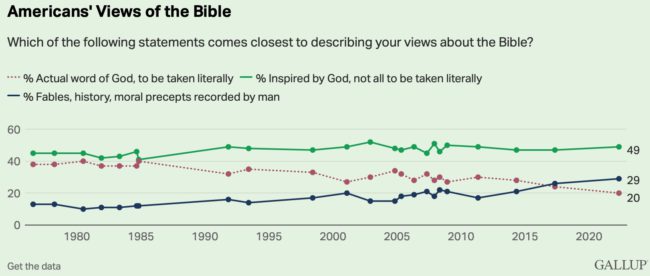
Gallup recently released the results of a poll that asked people how they view the bible. The question they asked was this …
Which of the following statements comes closest to describing your views about the Bible
— the Bible is the actual word of God and is to be taken literally, word for word
— the Bible is the inspired word of God but not everything in it should be taken literally
— the Bible is an ancient book of fables, legends, history, and moral precepts recorded by man
As you can perhaps guess, literally millions literally selected the first “literal” option. I’ll cover the results a bit further on towards the end, but first, let’s mull over Biblical Literalism for a bit.
Quick bit of Bible History
The text is challenging and has been the subject of almost constant debate. “Vigorous Disagreement” might sound glib, but it is not. There is no consensus of understanding, there never has been.
Dig and you soon discover just how complicated it all becomes. For example, if you use the term “The Bible” you would assume that there is a universal understanding regarding what this contains.
Nope.
The Catholic Bible is not the same as the Protestant Bible. The Catholic Bible consists of a 73 book canon and the Protestant Bible consists of 66 books.
In other words, if you believe the Bible to be the Literal Word of God, then those that are protestants (Evangelicals, Baptists, etc…) are only referring to 66 books, and those that are Catholic are referring to a collection of 73 books. In other words, while there might be many who agree that the Bible is the Literal Word of God, there is no universal consensus on what the term “Bible” actually refers to.
Putting aside that, you are also faced with the reality that there are some truly crazy things in parts of the text. Start with just the first few books, common to both the Protestant and Catholic Bibles, Genesis, Exodus, Leviticus, and Numbers, and consider this …
- Planet earth gets created long before the sun, moon and the rest of the universe
- Adam gets to name every single animal on Earth
- Adam and Eve just have two sons, so where do those sons get wives from? (Incest perhaps)
- Noah has three sons at the age of 500
- The ever so loving God slaughters everything, all humans and all living creatures except a few he saved on a boat.
- Lot offers his virgin daughters to a mob to appease them, and he is the good guy, the hero of the story.
- Lot’s wife turns into salt.
- Lot’s daughters get him drunk and then have sex with him
- Jacob wrestles with God … and wins.
- God travels in a cloud
- If you break one of God’s rules then you need to kill a goat
- A donkey talks, it gives Balaam some advice
- etc…
I’m really scratching the surface there. There is plenty more of the same. Within the context of our understanding of everything, all of it is utterly ridiculous, and wholly absurd.
When faced with such nonsense then how do some who revere the text handle it?
From the very beginning the solution has been a view that regards the challenging bits as metaphors. They are stories that are there to convey something and are not actual events. This was the stance taken by many of the very early Christian thinkers such as Origen and also Augustine of Hippo.
One solution Martin Luther came up with was to cut out the deeply challenging bits, and so we today have the 66 Book protestant Canon. It is generally just those 66 books that most literalists embrace. This is why the Catholic Bible has 73 books, the extras are the ones he chopped. I would love to know how many Catholics are literalists, but unfortunately the Gallup poll did not break it down like that.
Oh, and for the record, my little list above came, not from the really challenging Catholic bits, but from the Protestant books that are embraced by some as literal truth.
What do Literalists believe?
The bible is clear and open for all.
If something is not very obviously allegory, poetry, or symbolic, then it is considered by literalists to be a fact. For example Adam and Eve literally existed, there really was a world wide flood, etc…
Genesis is embraced as history.
This can and does lead to some truly strange beliefs. I was writing recently about the weird beliefs of a group called Answers in Genesis and illustrating just how crazy it can get. They promote the idea that Unicorns are real, and also that flying fire-breathing dragons are real. Apparently the Dragons are all gone because dragon slayers killed them all off. (That’s, if you will forgive the turn of phrase, literally their claim).
You think I’m kidding and mocking them right?
Nope, I link to their website. They are dead serious about it all.
You can find my article on them here – Bizarre Claim: Unicorns and Flying Fire-Breathing Dragons are real
Let’s get back to that poll.
What did the Gallup Poll reveal?
The trend they present is this …

In essence, the view of the bible is this …
- Literally True: 1970’s – 38%, Now – 20% … down 18%
- Inspired: 1970’s – 45%, Now – 49% … up 4%
- Myths: 1970’s – 13%, Now – 29% … up 16%
- No opinion: 1970’s – 5%, Now – 1% … down 4%
Literalism is very much in the decline and has hit an all time low.
You can find the details of the Gallup poll dated July 6, 2022 here – Fewer in U.S. Now See Bible as Literal Word of God
But Wait, there are a couple of odd statistics there – I have questions
Drill into how Gallup break it down and some unusual stuff pops up.
6% of those ticking “the Bible is the actual word of God and is to be taken literally, word for word“, are not a Christian of any type. They are either non-religious, or adhere to a different religious tradition (Jewish, Hindu, Muslim, etc…).
What the heck is that about?
I can perhaps speculate like this. Muslims, for example, do generally recognise the Bible as the word of God. They simply view it in the same manner that Christians would view Jewish scriptures with a thought that runs like this – we have a better more up to date divine text that supersedes that other one.
Something akin to that may be in play here.
Meanwhile, 16% of those that ticked “the Bible is an ancient book of fables, legends, history, and moral precepts recorded by man” do specifically identify as Christian. If indeed the Bible is something you don’t believe, yet you do still identify as Christian, then what exactly is it that you believe?
What the heck is that about?
I can perhaps speculate that some might culturally identify as “Christian”, because that is the tradition they were brought up in, hence if asked what religion they are, they say “Christian”, but in reality they don’t embrace the beliefs as really true. They might even attend a church because they enjoy the social interaction. No belief is required for that.
Such odd statistics often pop up because things under the covers are quite complex and not as simplistic and binary as the question asked assumes it to be. There always is nuance. If you have weird statistics such as the above, then it suggests that there is a problem with the way people are interpreting the question being asked.
One last Thought – A reality Check
It’s not a binary choice, nor is it a package deal.
Belief for most operates rather like a pick-and-mix candy store. People will generally cherry-pick stuff that brings them comfort and meaning, and then brush over and disregard the rest.
A classic example that illustrates this rather well is Catholicism. Officially the stance is that any form of artificial contraception is a sin, but in reality most Catholics simply ignore that and use it anyway. If they feel guilty then they can simply go to confession to sooth that guilt and make it all good with a few Hail Mary’s.
The party line for literalists is yes, the bible is literally true. If you then politely point out a truly strange bible passage, then they often advise, “Ah no, not that bit, that is poetry / symbolic, but the rest is all true“. Rinse and repeat with various passages.
In other words, most of the literalists are not as strictly literal as the Answers In Genesis folks who sincerely believe in flying fire-breathing dragons and Unicorns.
A non-believer encountering somebody from Answers In Genesis who is witnessing Jesus to them might try a bit of mockery by saying, “I believe in magic Unicorns“. In that specific case the non-believer would then be utterly astonished to hear, “So do I because the bible says so“.
